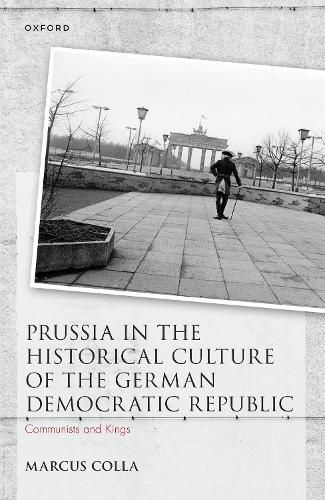Readings Newsletter
Become a Readings Member to make your shopping experience even easier.
Sign in or sign up for free!
You’re not far away from qualifying for FREE standard shipping within Australia
You’ve qualified for FREE standard shipping within Australia
The cart is loading…






No example demonstrates the fluidity of the past within the German Democratic Republic more powerfully than the history of the Prussian state. Initially attacked in East German official histories as the historical engine of German militarism and reaction, Prussia underwent a remarkable transformation in official and public memory from around the end of the 1970s. This was the so-called ‘Prussia-Renaissance’, in which, for the first time, the East German state began to recognise and even celebrate figures from Prussian history who had not served a ‘progressive’ agenda. But the ‘Prussia-Renaissance’ was also a political and cultural phenomenon with a wide public resonance. The ‘Prussia-Renaissance’ may have been a relatively short-lived phenomenon, but it evidently opened a deep vein in the historical memory of the German Democratic Republic that defied reduction to ‘high politics’ alone. This book asks why.
Using the case study of Prussia, Marcus Colla presents a multi-perspective approach to the way that a distinctive ‘historical culture’ was constructed in the German Democratic Republic. It not only evaluates the roles played by political figures, historians, and cultural elites, but also heritage preservationists, exhibition curators, heimat museums, television producers, novelists and playwrights, and singers - the purveyors of what we might more generally term ‘popular culture’. In essence, Colla poses four fundamental questions for our understanding of life, politics and culture in communist East Germany: how was history there made? How was it understood? How was it contested? And how was it used?
$9.00 standard shipping within Australia
FREE standard shipping within Australia for orders over $100.00
Express & International shipping calculated at checkout
No example demonstrates the fluidity of the past within the German Democratic Republic more powerfully than the history of the Prussian state. Initially attacked in East German official histories as the historical engine of German militarism and reaction, Prussia underwent a remarkable transformation in official and public memory from around the end of the 1970s. This was the so-called ‘Prussia-Renaissance’, in which, for the first time, the East German state began to recognise and even celebrate figures from Prussian history who had not served a ‘progressive’ agenda. But the ‘Prussia-Renaissance’ was also a political and cultural phenomenon with a wide public resonance. The ‘Prussia-Renaissance’ may have been a relatively short-lived phenomenon, but it evidently opened a deep vein in the historical memory of the German Democratic Republic that defied reduction to ‘high politics’ alone. This book asks why.
Using the case study of Prussia, Marcus Colla presents a multi-perspective approach to the way that a distinctive ‘historical culture’ was constructed in the German Democratic Republic. It not only evaluates the roles played by political figures, historians, and cultural elites, but also heritage preservationists, exhibition curators, heimat museums, television producers, novelists and playwrights, and singers - the purveyors of what we might more generally term ‘popular culture’. In essence, Colla poses four fundamental questions for our understanding of life, politics and culture in communist East Germany: how was history there made? How was it understood? How was it contested? And how was it used?